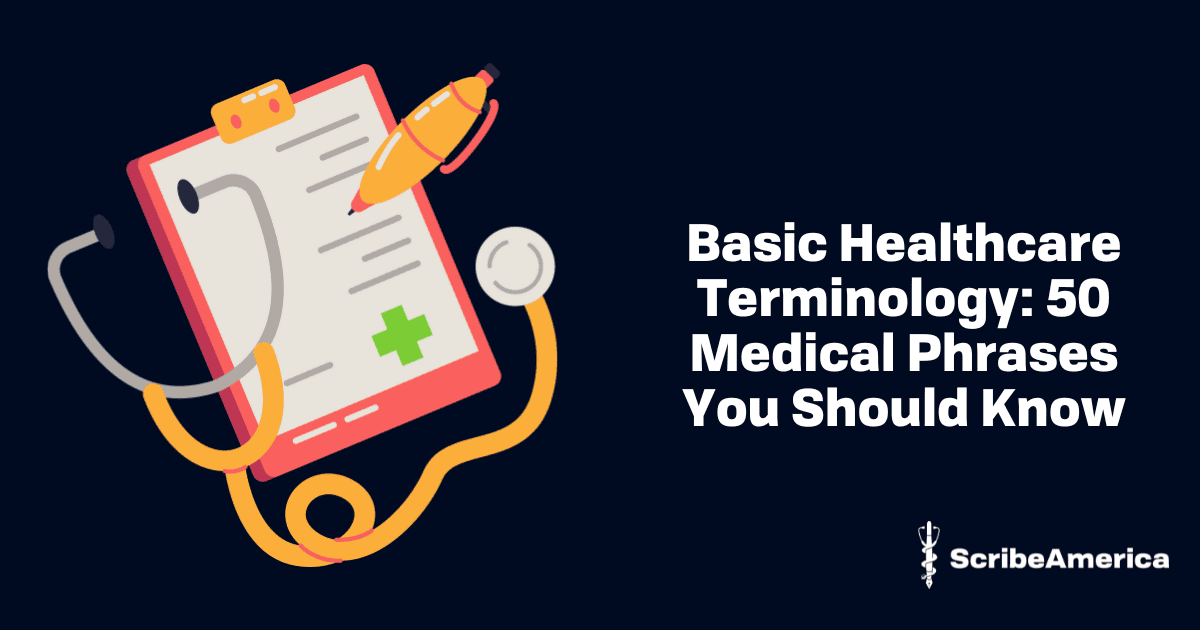Knowing common healthcare terminology can help you navigate discussions with doctors, interpret medical records, and ensure better communication as a medical scribe. To help you stay informed, we’ve compiled 50 must-know medical terms, explained in a way that simply makes sense.
General medical terms
This fundamental healthcare terminology frequently appears in medical charts, prescriptions, and diagnoses:
|
Term |
Meaning |
|
Acute |
Something (e.g., condition, symptom) that comes on suddenly and lasts a short time |
|
Chronic |
A long-lasting condition, often lifelong |
|
Diagnosis |
The identification of a disease or condition |
|
Prognosis |
The expected outcome of a disease |
|
Symptom |
A patient’s experience of illness (e.g., pain, fatigue) |
|
Sign |
A measurable indicator of disease (e.g., fever, rash) |
|
Treatment |
The course of action to cure or manage an illness |
|
Etiology |
The cause of a disease |
|
Pathology |
The study of disease and its effects |
|
Syndrome |
A group of symptoms that occur together |
Anatomy & physiology terms
This healthcare terminology will help you grasp how the body works:
|
Term |
Meaning |
|
Cardiovascular |
Related to the heart and blood vessels |
|
Neurology |
The study of the nervous system |
|
Respiratory |
Related to breathing and the lungs |
|
Gastrointestinal |
Referring to the stomach and intestines |
|
Musculoskeletal |
Related to muscles and bones |
|
Endocrine |
The system that controls hormones |
|
Renal |
Related to the kidneys |
|
Hepatic |
Related to the liver |
|
Dermatology |
The study of skin |
|
Immunology |
The study of the immune system |
Common diagnostic & procedural terms
|
Term |
Meaning |
|
Biopsy |
The removal of tissue for examination |
|
MRI |
A scan that creates detailed images of the body |
|
CT Scan |
A type of X-ray that shows cross-sectional images |
|
Ultrasound |
Imaging using sound waves |
|
ECG/EKG |
A test that measures heart activity |
|
Endoscopy |
A procedure using a camera to view inside the body |
|
Lumbar Puncture |
A spinal tap to collect cerebrospinal fluid |
|
Dialysis |
A treatment for kidney failure |
|
Intubation |
Placing a tube into the airway to assist breathing |
|
Anesthesia |
Medication used to prevent pain during surgery |
Healthcare terminology related to medications & treatment
|
Term |
Meaning |
|
Antibiotic |
A drug that fights bacterial infections |
|
Analgesic |
Pain relief medication |
|
Antipyretic |
A medication that reduces fever |
|
Anti-inflammatory |
A drug that reduces swelling and pain |
|
Anticoagulant |
A medication that prevents blood clotting |
|
Dosage |
The amount of medication prescribed |
|
Contraindication |
A reason why a treatment shouldn’t be used |
|
Side effect |
An unintended reaction to a medication |
|
Prescription |
A doctor's order for medication |
|
Over-the-Counter (OTC) |
Medications available without a prescription |
Medical scribes & documentation terms
The terms below often appear in medical documentation, so if you’re a medical scribe or an aspiring medical scribe, be sure to check them out:
|
Term |
Meaning |
|
SOAP note |
A structured way to document patient encounters |
|
Chief complaint (CC) |
The main reason a patient seeks care |
|
HPI (History of Present Illness) |
A detailed description of the patient’s symptoms |
|
ROS (Review of Systems) |
A checklist of symptoms by body system |
|
EMR (Electronic Medical Record) |
A digital version of a patient’s medical history |
|
Differential diagnosis |
A list of possible conditions based on symptoms |
|
Progress notes |
Daily updates on a patient’s condition |
|
Discharge summary |
A report detailing a patient’s hospital stay |
|
Coding |
Assigning medical codes for billing purposes |
|
Transcription |
Converting spoken medical notes into written records |
The takeaway
So, why is medical terminology important in healthcare? Because good communication saves time, reduces errors, and improves patient care. Now that you’re familiar with basic healthcare terminology, you’re better prepared to understand medical conversations, read patient charts, prepare quality documentation, and navigate healthcare settings with confidence.
Also check out our article on good healthcare terms to know for a medical scribe job.




